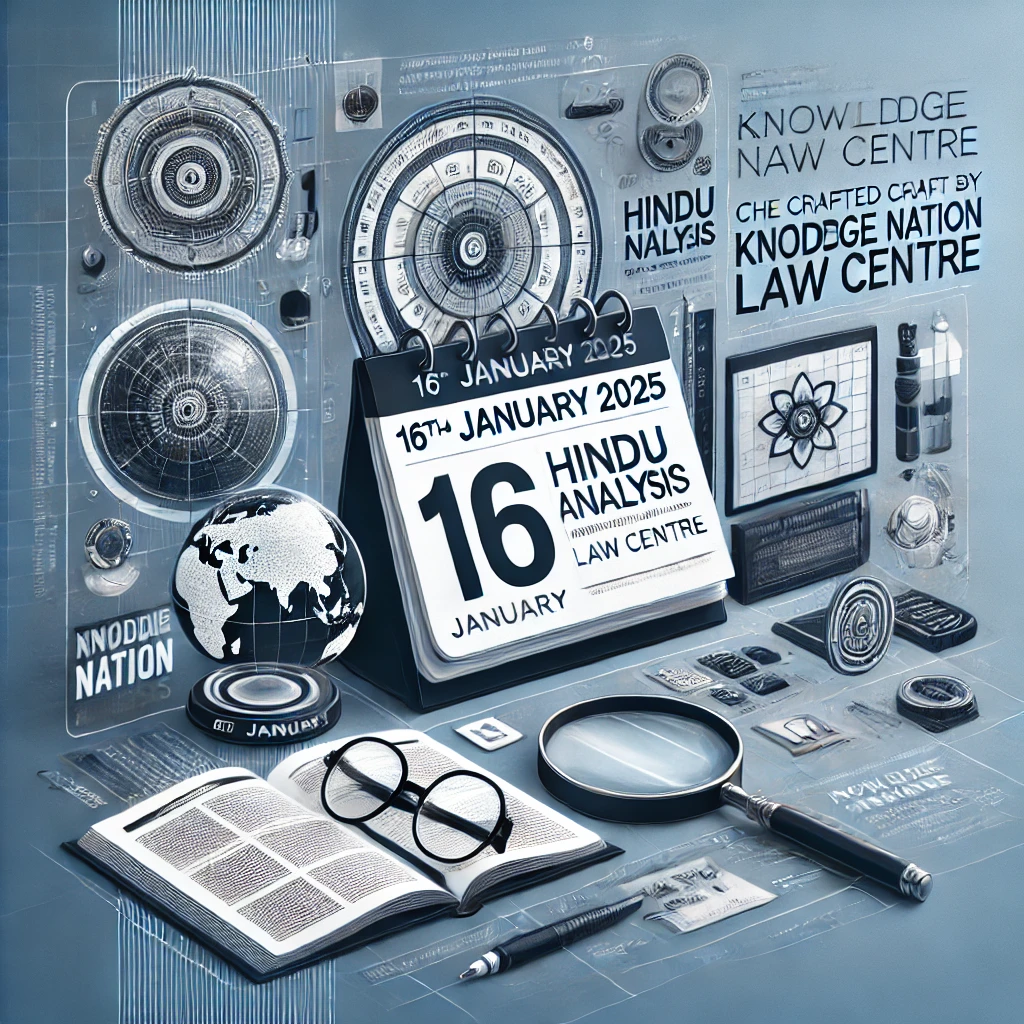16 January 2025 : The Hindu Anslysis (Daily Current Affairs)
Join WhatsApp community for Free Notifications, Updates, Study Material, Mock Tests, Internship Updates, and Current Affairs - CLICK HERE TO JOIN
1. ‘Strange’ particle possesses mass when moving in one direction, not another
(Source – The Hindu, International Edition – Page No. – 7)
Topic: Science and Technology
Context
- Physicists are uncovering novel and unusual subatomic particles, such as semi-Dirac fermions, which enhance our comprehension of matter and the laws governing nature.
Understanding Subatomic Particles
- Subatomic particles serve as the fundamental constituents of all matter in the universe.
- They are categorized into two primary groups: fermions and bosons. Fermions, including electrons and protons, constitute matter.
- They form the atomic structure and, consequently, all surrounding matter. Bosons, like photons, facilitate force transmission between various matter particles.
- They are crucial in mediating forces such as light and gravity, enabling particle interactions.
- Grasping these particles elucidates the workings of the universe. Both fermions and bosons play vital roles in shaping our physical reality.
To Enroll in Knowledge Nation Law Centre - Click Here
Types of Fermions
- Fermions are classified as Dirac fermions or Majorana fermions. Dirac fermions may have mass or be massless and differ from their corresponding antiparticles.
- Majorana fermions are identical to their antiparticles, and neutrinos are thought to belong to this category.
Challenges in Particle Physics
- Physicists encounter difficulties in identifying elusive particles, such as those implicated in gravity.
- Certain particles, including Higgs bosons and neutrinos, exhibit greater mass than anticipated.
- Dark matter remains a conundrum, as its existence has not been directly observed.
- The Standard Model (SM) catalogues known particles but has deficiencies that require addressing.
Discovery of Semi-Dirac Fermions
- Physicists encounter difficulties in identifying elusive particles, such as those implicated in gravity.
- Certain particles, including Higgs bosons and neutrinos, exhibit greater mass than anticipated.
- Dark matter remains a conundrum, as its existence has not been directly observed.
- The Standard Model (SM) catalogues known particles but has deficiencies that require addressing.
Role of Condensed Matter Physics
- Condensed matter physics facilitates the discovery of exotic particles through smaller, controlled experiments.
- Materials like graphene and ZrSiS serve as hosts for particles such as semi-Dirac fermions.
- This discipline provides critical insights without the need for large particle colliders.
Future Research and Implications
- Condensed matter physics facilitates the discovery of exotic particles through smaller, controlled experiments.
- Materials like graphene and ZrSiS serve as hosts for particles such as semi-Dirac fermions.
- This discipline provides critical insights without the need for large particle colliders.
Join WhatsApp community for Free Notifications, Updates, Study Material, Mock Tests, Internship Updates, and Current Affairs - CLICK HERE TO JOIN
2. Does ‘blood money’ have a legal standing?
(Source – The Hindu, International Edition – Page No. – 10)
Topic: Indian Society
Context
- The article examines the concept of 'blood money' in Islamic law, detailing its application across various countries and its significance in compensating crime victims. It also analyzes India's legal position, historical context, and recent examples of its implementation.
What is ‘Blood Money’?‘Blood money’, also known as ‘diya’, is a concept under Islamic Sharia law.
- It entails the payment of a designated sum to the victim or their family in cases of unintentional murder or homicide.
- The intention is not to assign monetary value to human life but to alleviate the suffering of the victim's family and address their potential financial loss.
- Should the victim's family forgive the offender, they may accept 'blood money' instead of pursuing retribution (qisas).
- Acceptance of 'blood money' does not prevent the community and state from enforcing additional penalties, including fines.
Contemporary Use of ‘Blood Money’
- Various Islamic countries have laws regarding 'blood money,' with discrepancies in compensation calculations.
- For instance, in Saudi Arabia, 'blood money' is required in traffic accidents, alongside a prison sentence for the offender.
- The regulations surrounding 'blood money' in Saudi Arabia, Iran, and Pakistan vary based on gender, religion, and nationality.
- In Iran, compensation for women is half that of men, although initiatives to achieve equality have emerged.
- Pakistan integrates 'blood money' and retribution within its legal framework. Yemen permits the parties to negotiate compensation, under judicial oversight.
To Enroll in Knowledge Nation Law Centre - Click Here
India’s Stand on ‘Blood Money’
- India lacks a specific legal framework for 'blood money.
- ' Nevertheless, a similar concept exists in the form of 'plea bargaining,' established by the Criminal Law (Amendment) Act, 2005.
- Plea bargaining enables the accused to plead guilty in exchange for a reduced sentence or lesser charges.
- In contrast to 'blood money,' plea bargaining has restrictions; it is applicable only to offenses punishable by less than seven years of imprisonment and cannot be utilized for severe crimes such as murder or rape.
- Victims may receive compensation during plea bargaining, akin to 'blood money,' under Section 265E of the Criminal Procedure Code.
Historical Practices Similar to ‘Blood Money’
- Comparable practices to 'blood money' are present in various cultures.
- In ancient Ireland, Brehon law included 'Éraic' (body price) and 'Log nEnech' (honor price), which determined compensation based on the crime's severity and the victim's social status.
- Welsh laws featured a corresponding compensation mechanism known as 'Galanas,' where the compensation amount depended on the victim's rank.
- The Germanic tradition of 'Wergeld' also involved compensating the victim's family in cases of homicide or serious offenses.
Indian Cases Involving ‘Blood Money’
- Numerous Indian nationals have received pardons through 'blood money' in the past.
- In 2019, the death sentence of an Indian citizen in Kuwait was commuted to life imprisonment following the payment of 'blood money' by his family.
- Other Indian nationals in the UAE were similarly pardoned after paying 'blood money' for serious crimes.
- In the present case, efforts are being made to explore the possibility of commuting a death sentence through 'blood money'.
Conclusion
- 'Blood money' acts as a mechanism for reconciliation in specific legal frameworks, with the intent of compensating the families of victims.
- This practice is a topic of ongoing debate, raising questions about its fairness and execution in various nations.
Join WhatsApp community for Free Notifications, Updates, Study Material, Mock Tests, Internship Updates, and Current Affairs - CLICK HERE TO JOIN
3. US Sanctions on Russia’s Oil Trade Pose Challenges for India Amid Shifting Global Dynamics
(Source – Indian Express, Section – Explained – Page No. – 14)
Topic: Indian Economy, International Relations
Context
- The outgoing US administration has enacted extensive sanctions on Russia’s oil trade, impacting 183 vessels of the “shadow fleet,” prominent Russian oil firms, insurance companies, and additional stakeholders in the oil industry.
Analysis of the news:
Implications for India
- Russia, which supplies nearly 38% of India’s crude oil, is India’s largest oil supplier.
- While Indian refiners can honor existing contracts until March 12, the sanctions are expected to disrupt the India-Russia oil trade beyond this transition period.
- Nevertheless, India's overall oil imports will remain stable, as there are ample alternative supplies from West Asia.
Rising Freight Costs and Shifting Suppliers
- Sanctions will limit tanker availability for transporting Russian oil, leading to increased freight costs.
- Consequently, the discounts on Russian crude will diminish, making oil from traditional suppliers such as Iraq, Saudi Arabia, and the UAE more competitive.
- Indian refiners are already increasing imports from these nations to mitigate possible disruptions.
Russia’s Dilemma and the Price Cap
- Sanctions will limit tanker availability for transporting Russian oil, leading to increased freight costs.
- Consequently, the discounts on Russian crude will diminish, making oil from traditional suppliers such as Iraq, Saudi Arabia, and the UAE more competitive.
- Indian refiners are already increasing imports from these nations to mitigate possible disruptions.
Impact of the Incoming US Administration
- Donald Trump’s upcoming presidency has the potential to alter US policy concerning Russia and Ukraine.
- Although Trump has signified a desire to negotiate peace, the approach of his administration regarding sanctions remains unclear.
- The new sanctions could provide leverage for Trump in dealings with Moscow, potentially affecting the Russia-Ukraine conflict and global oil trade dynamics.
To Enroll in Knowledge Nation Law Centre - Click Here
Conclusion
- Donald Trump’s upcoming presidency has the potential to alter US policy concerning Russia and Ukraine.
- Although Trump has signified a desire to negotiate peace, the approach of his administration regarding sanctions remains unclear.
- The new sanctions could provide leverage for Trump in dealings with Moscow, potentially affecting the Russia-Ukraine conflict and global oil trade dynamics.
How has India Benefitted from Discounted Russian Oil?
- Significant Savings by Indian Refiners
- Indian refiners realized savings of at least $7. 17 billion in foreign exchange over the 14 months ending in May 2023 by increasing purchases of discounted Russian oil.
- India imported oil worth $186. 45 billion from April 2022 to May 2023; this figure would have totaled $193. 62 billion had Indian refiners paid the average price for crude from all other suppliers combined.
- Emergence of India as a Major Supplier of Refined Petroleum Products
- India has become a prominent supplier of petrol and dieselsome refined from Russian crudeto Europe and beyond.
- Exports of petroleum products from India to the EU surged by 20. 4 percent year-on-year from April to January, totaling 11. 6 million tonnes, resulting in "robust margins" for Indian refiners.
Join WhatsApp community for Free Notifications, Updates, Study Material, Mock Tests, Internship Updates, and Current Affairs - CLICK HERE TO JOIN
Facts
1. U.S., Japan moon landers launch on single rocket
(Source – The Hindu, International Edition – Page No. – 7)
Context
- A SpaceX Falcon 9 rocket successfully launched two lunar landers: Blue Ghost by Firefly Aerospace (U. S. ) and Resilience by ispace (Japan). This event, which occurred at Kennedy Space Center, Florida, on Wednesday, represents a significant advancement for private sector participation in space exploration.
Mission Objectives
- A SpaceX Falcon 9 rocket successfully launched two lunar landers: Blue Ghost by Firefly Aerospace (U. S. ) and Resilience by ispace (Japan). This event, which occurred at Kennedy Space Center, Florida, on Wednesday, represents a significant advancement for private sector participation in space exploration.
To Enroll in Knowledge Nation Law Centre - Click Here
Details of the Landers
- Blue Ghost: A SpaceX Falcon 9 rocket successfully launched two lunar landers: Blue Ghost by Firefly Aerospace (U. S. ) and Resilience by ispace (Japan). This event, which occurred at Kennedy Space Center, Florida, on Wednesday, represents a significant advancement for private sector participation in space exploration.
- Resilience: It will take 4-5 months to reach Mare Frigoris, located on the far north side of the moon.This lander carries a micro rover named ‘Tenacious’, designed to collect moon dust and transmit images.
Challenges
- It will take 4-5 months to reach Mare Frigoris, located on the far north side of the moon.
- This lander carries a micro rover named ‘Tenacious’, designed to collect moon dust and transmit images.
Join WhatsApp community for Free Notifications, Updates, Study Material, Mock Tests, Internship Updates, and Current Affairs - CLICK HERE TO JOIN
2. Argentine inflation drops
(Source – The Hindu, International Edition – Page No. – 13)
Context
- Argentina has seen significant inflation reduction under President Javier Milei’s austerity measures, which include budget cuts and public sector layoffs, leading to economic challenges and protests.
Status of Argentine Economy:
- In 2024, Argentina’s inflation rate dropped to 117.8%, a sharp decline from previous years, signaling a reduction in price increases.
- The government, under President Javier Milei, claims this drop in inflation reflects the success of its stabilization plan, which began with his tenure.
- Milei’s austerity measures, which included a 52% devaluation of the peso and the firing of over 33,000 public sector employees, played a key role in reducing inflation.
To Enroll in Knowledge Nation Law Centre - Click Here
- Despite these efforts, poverty is high, with 57.4% of people living below the poverty line.
- Instead these reforms plunged Argentina into a deep recession, pushing an additional five million people into poverty in 2024.
- Despite facing protests, Milei asserts that the economic pain will result in long-term economic stability and growth.
Join WhatsApp community for Free Notifications, Updates, Study Material, Mock Tests, Internship Updates, and Current Affairs - CLICK HERE TO JOIN
3. India Bolsters Maritime Strength: INS Nilgiri, INS Surat, and INS Vaghsheer Commissioned into Indian Navy
(Source – Indian Express, Section – Explained- Page No. – 14)
Context
- The Indian Navy has commissioned three advanced vessels INS Nilgiri, a stealth frigate; INS Surat, a guided missile destroyer; and INS Vaghsheer, a Scorpene-class submarine, representing a significant enhancement in its operational and strategic capabilities.
Analysis of the news:
INS Nilgiri: Versatile Stealth Frigate
- INS Nilgiri, the leading ship of the Project 17A frigates, is designed for multi-mission operations in blue-water conditions.
- It is outfitted with supersonic missiles, advanced air defense systems, and rapid-fire weapons, excelling in anti-surface, anti-air, and anti-submarine warfare.
- Constructed using an “integrated construction” approach, it minimizes build time and improves efficiency.
- The frigate serves as a modern upgrade to the Shivalik-class vessels, with six additional ships under Project 17A currently at various stages of construction.
INS Surat: AI-Enabled Stealth Destroyer
- INS Nilgiri, the leading ship of the Project 17A frigates, is designed for multi-mission operations in blue-water conditions.
- It is outfitted with supersonic missiles, advanced air defense systems, and rapid-fire weapons, excelling in anti-surface, anti-air, and anti-submarine warfare.
- Constructed using an “integrated construction” approach, it minimizes build time and improves efficiency.
- The frigate serves as a modern upgrade to the Shivalik-class vessels, with six additional ships under Project 17A currently at various stages of construction.
To Enroll in Knowledge Nation Law Centre - Click Here
INS Vaghsheer: Silent and Lethal Submarin
- INS Vaghsheer, the concluding vessel of the Kalvari-class submarines under Project 75, is a diesel-electric “hunter-killer” submarine.
- Known for its stealth and adaptability, it is armed with wire-guided torpedoes, anti-ship missiles, and sophisticated sonar systems.
- Its modular construction allows for future upgrades, including Air Independent Propulsion (AIP) technology, thus improving underwater endurance.
- Vaghsheer is crucial for missions involving surveillance, intelligence collection, and special operations.
Strategic Significance of the Additions
- The concurrent commissioning of a frigate, destroyer, and submarine demonstrates India’s naval capabilities and its dedication to enhancing maritime security.
- These platforms strengthen India’s ability to deter regional threats, secure maritime trade routes, and maintain strategic influence in the Indian Ocean Region (IOR).
- Their domestic production aligns with India’s Make in India initiative and bolsters global confidence in India's defense manufacturing capabilities.
Join WhatsApp community for Free Notifications, Updates, Study Material, Mock Tests, Internship Updates, and Current Affairs - CLICK HERE TO JOIN
4. ISRO Successfully Grows Cowpea Seedlings in Space, Marking a Milestone in Space Agriculture
(Source – Indian Express, Section – Explained- Page No. – 14)
Context
- ISRO achieved a significant milestone with its first biological experiment in space under the CROPS (Compact Research Module for Orbital Plant Studies) program.
Analysis of the news:
Success of the Experiment
- The experiment involved growing cowpea seedlings (Vigna unguiculata) aboard the POEM-4 module in the microgravity environment of space.
- Out of eight cowpea seeds cultivated within a controlled environment featuring active thermal management, three successfully sprouted leaves.
- This accomplishment demonstrates ISRO’s ability to grow plants in space and offers insights into sustainable human presence during long-duration space missions.
To Enroll in Knowledge Nation Law Centre - Click Here
Significance for Future Missions
- The success of the CROPS experiment is a step forward in developing technologies for space-based agriculture, which will be essential for sustaining life during future deep-space missions.
- The insights gained from this experiment will contribute to ensuring food security and long-term habitability in extraterrestrial environments.
Broader Implications
- This experiment highlights ISRO’s advancements in integrating biological research with space exploration, paving the way for innovative approaches to support human life in space.
- The mission also serves as a foundation for further studies in astrobiology and the development of self-sustaining ecosystems beyond Earth.

 Info@Knowledgenation.co.in
Info@Knowledgenation.co.in











Leave a Comment